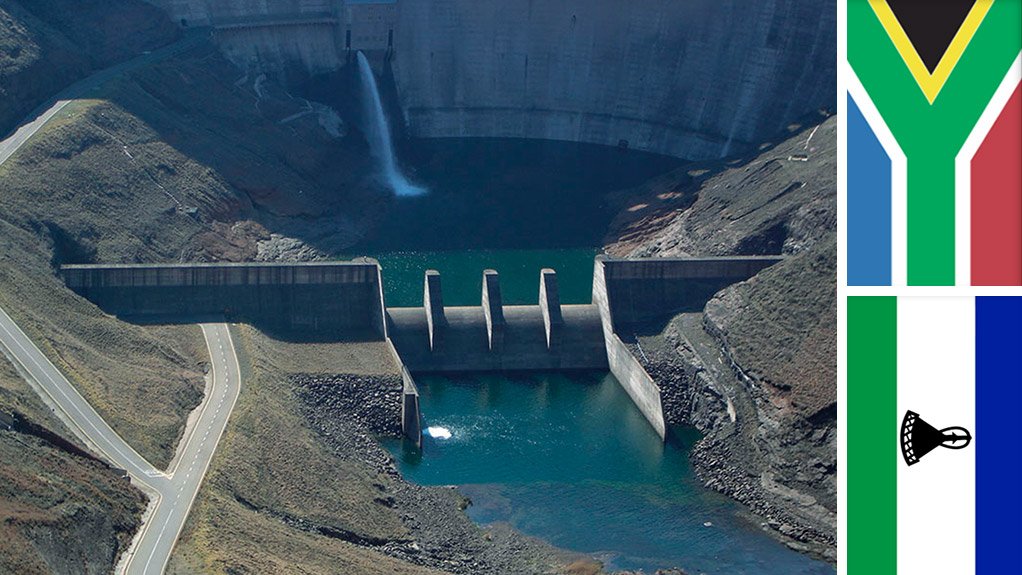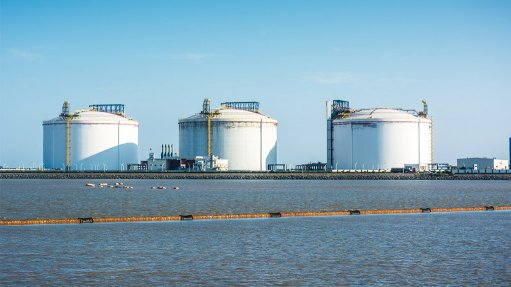Lesotho Highlands Water Project – Phase II, Lesotho
Name of the Project
Lesotho Highlands Water Project (LHWP) – Phase II.
Location
Lesotho.
Client
Implementing Authority
The Lesotho Highlands Development Authority (LHDA).
Oversight Authority
The Lesotho Highlands Water Commission has an oversight function, is the channel of governments’ input into the project, represents and advises the two governments, as well as monitors the activities of the LHDA.
Project Description
Phase II of the LHWP builds on the 2003 completion of Phase I, which supplies water to Gauteng and uses the water delivery system to generate hydroelectricity for Lesotho.
Phase II will increase the current supply rate of 780-million cubic metres a year incrementally to more than 1.27-billion cubic metres a year.
Phase II of the LHWP will be implemented in terms of two distinct components: a water delivery system to augment the delivery of water to South Africa and a hydropower generation system, which will increase the current electricity generation capacity in Lesotho.
Polihali dam
The Polihali dam will be constructed as a concrete-faced rockfill embankment, with a side-channel spillway about 164 m high.
The crest length will be about 915 m, with a full supply level of 2 075 m above sea level. A 50-m-high saddle dam will also be built.
Polihali to Katse tunnel
The estimated 38-km-long, nominal bore 5-m-diameter Polihali–Katse dam tunnel will be constructed to transfer water from the Polihali reservoir to the Katse reservoir.
Water will be abstracted from the Polihali reservoir through two separate concrete bell-mouth intakes on the western side of the Polihali reservoir, in the Khubelu river, 3 km upstream of the confluence with the Senqu river.
Advance infrastructure
Phase II will require extensive infrastructure development before the mobilisation of contractors for the two main water transfer works contracts of the Polihali dam and transfer tunnel. Where possible, the existing infrastructure constructed in Phase I will be used. This includes access roads, power supply, telecommunication systems and camps. Significant additional works contracts will be awarded for the construction of all-weather access roads, a bulk power supply network, telecommunications systems and project housing, as well as labour camps on both ends of the transfer tunnel.
A permanent housing development will be established near the Polihali dam and transfer tunnel, which will consist of project offices, and residential and community facilities.
The Polihali intake site will use the infrastructure employed to construct the Polihali dam and transfer tunnel. This includes feeder roads and bridges around the reservoir to connect affected communities, power supply systems, construction camps and communications. The infrastructure at Katse dam and in the Matsoku valley will also be available for the Polihali–Katse tunnel construction. Existing accommodation facilities will be used to house consultants and construction management teams. Improvements to the water and sewage treatment plants, clinic and lodge will also be undertaken.
Other infrastructure
Other access and feeder roads will be built around the reservoir to connect affected communities using pedestrian and light-vehicle bridges, while a pair of major road bridges will be built over the Polihali reservoir, at Mapholaneng, crossing the Khubelu river, and near Mokhotlong, crossing the Senqu river.
Environmental measures
An environmental and social management programme is being implemented to address potential environmental and social impacts associated with Phase II activities.
The programme comprises baseline studies completed in 2013 and 2014, including studies pertaining to environmental flow requirements, and biological and archaeological (including heritage) aspects, as well as socioeconomic and public health studies. It also includes environmental- and social-impact assessments (ESIAs), and the implementation of the subsequent environmental and social management and action plans. These are in progress.
Social development programmes
These programmes, mitigation measures, resettlement requirements and baseline studies, as well as public relations/community engagement and awareness campaigns, will be implemented. The full extent of these measures is being studied and discussed.
The design of these programmes is being informed by the outcome of the baseline studies. The resultant sustainable development programmes to be designed and implemented will be agreed on with the affected communities.
Pumped-storage scheme
The Phase II agreement on the LHWP determined that the hydropower generation component would comprise the Kobong pumped storage scheme or any other similar scheme subject to agreement on the outcome of further feasibility studies.
These were to include a market study, an integration study, geotechnical investigations, and legal and commercial arrangements. The additional feasibility studies, which are nearing completion, have also explored alternative viable hydropower generation schemes. The outcome is that further feasibility studies on the Kobong pumped-storage scheme have been deferred. The decision has been reached to instead advance the feasibility studies on conventional hydropower options to full bankability stage.
Potential Job Creation
Based on what transpired during the implementation of Phase I of the project, more than 3 000 jobs are expected to be created at the height of the construction phase of the main works of Phase II.
Value
As per the December 2017 long-term cost plan, the cost of the Phase II water transfer component at the date of project completion in 2025 was estimated at R24-billion. The cost of the hydropower component is yet to be established.
Duration
Completion of the project, initially slated for 2020 as per the times suggested in the feasibility studies, is now expected in December 2025, based on the current project programme compiled by the Project Management Unit.
Latest Developments
The LHDA has started a series of workshops with registered construction companies in Gauteng and the Free State to explain the procurement framework of the LHWP – Phase 2 and to share lessons learned from previous tender submissions.
The main purpose of the workshops is to improve compliance and participation in the LHWP Phase 2’s works.
Key Contracts and Suppliers
To date, several contracts have been awarded for various elements of the advance infrastructure works. These include:
Contract 3004: Professional services for the planning, design and construction supervision of the Polihali western access road (PWAR).
The LHDA awarded the contract to AECOM SA, together with Lesotho-based subconsultants AECOM Lesotho and RWB Consulting Engineers in August 2016. The tenders for the construction of the PWAR were advertised in the second quarter of 2018.
Contract 3008: Professional services for the bulk power supply and telecommunications.
The contract was awarded in August 2016 to Plantech-SM Joint Venture (JV). The procurement of the contractors for the construction and relocation of power lines is under way.
Contract 3009: Professional services for the planning, design and construction supervision of housing and associated infrastructure.
The contract was awarded in June 2015 to Polihali Infrastructure Consultants – a JV comprising South Africa-based engineering consultancy Mott MacDonald and Lesotho-based Khatleli Tomane Moteane. The evaluation of the tenders for the construction of the infrastructure civil works (this includes roads, water and wastewater systems, electricity and telecoms supply) is nearing completion. It will be followed by the advertising of the tender for the construction of houses, the lodge and operation centre.
Contract 3014: Professional services for the design and construction supervision of the Polihali north-east access road.
The contract was awarded in April 2015 to SMEC-FMA JV, comprising the Bloemfontein branch of international engineering consultancy SMEC and Lesotho-based civil engineering firm FM Associates. Procurement of the contractors has started, with the tender having been advertised in the last quarter of 2017.
Contract 3015: Professional services for the evaluation, optimisation and site supervision of geotechnical investigations.
The contract was awarded in May 2015 to consultant Jeffares & Green (now called JG Afrika) and Lesotho-based GWC Consulting Engineers.
Contract 3017: Professional Services for the demarcation of the Polihali reservoir.
This entailed the construction of more than 1 300 beacons to mark the 230 km perimeter of the reservoir.
The contract was awarded in April 2015 to Lesotho-based consultancy Maleka, Ntshihlele, Putsoa JV.
The reservoir demarcation was completed in December 2015.
Contract 3022: Professional services for the design and supervision of the Polihali diversion tunnels.
The contract was awarded in October 2016 to MSKC JV. The procurement of the contractors for the construction of the diversion tunnel started in the last quarter of 2017 and the tender closed in January 2018.
Contract 4016: Geotechnical investigation works for the Polihali dam and Polihali–Katse transfer tunnel.
The contract was awarded to geotechnical drilling company Diabor in November 2015. The investigations will take place in two stages. The first was completed early in 2017 and the second is under way, following the appointment of the dam engineer in late June 2017.
Contract 6004: Professional services for the environmental- and social-impact assessment for the Polihali western access corridor (PWAC).
The contract was awarded in October 2016 to a JV comprising Environmental Resources Management (ERM) Southern Africa and Lesotho-based Sechaba Consultants. In March 2018, the Lesotho Ministry of Tourism, Environment and Culture issued the LHDA with a Record of Decision comprising environmental authorisation for the proposed Polihali Western Access Corridor, following the completion of the PWAC ESIA and the associated environmental management plan, effectively granting environmental authorisation to proceed with the PWAC construction activities.
Contract 6010: Professional services for the development of a Phase II safety, environment and quality management framework.
The contract was awarded in October 2016 to Rori Management Consultancy.
Contract 6014: Professional services for the environmental- and social-impact assessment for the Polihali reservoir and associated infrastructure.
The contract was awarded in August 2016 to a JV comprising ERM Southern Africa and Lesotho-based Sechaba Consultants.
Contract 6015: Professional services for the resettlement planning and implementation: Polihali site establishment and reservoir area.
The contract was awarded to the LIMA Thaha JV in September 2016.
The registration of the assets of the households affected by the advanced infrastructure is under way.
The advance infrastructure will be largely completed before the start of the main works in 2020.
On Budget and on Time?
Water delivery is expected to begin in December 2025, based on the current project programme. It is too early to comment on the hydropower component, as its exact form is still to be determined by the ongoing feasibility studies.
Contact Details for Project Information
LHDA public relations manager Masilo Phakoe, tel +266 62857272 or email phakoem@lhda.org.ls.
Comments
Press Office
Announcements
What's On
Subscribe to improve your user experience...
Option 1 (equivalent of R125 a month):
Receive a weekly copy of Creamer Media's Engineering News & Mining Weekly magazine
(print copy for those in South Africa and e-magazine for those outside of South Africa)
Receive daily email newsletters
Access to full search results
Access archive of magazine back copies
Access to Projects in Progress
Access to ONE Research Report of your choice in PDF format
Option 2 (equivalent of R375 a month):
All benefits from Option 1
PLUS
Access to Creamer Media's Research Channel Africa for ALL Research Reports, in PDF format, on various industrial and mining sectors
including Electricity; Water; Energy Transition; Hydrogen; Roads, Rail and Ports; Coal; Gold; Platinum; Battery Metals; etc.
Already a subscriber?
Forgotten your password?
Receive weekly copy of Creamer Media's Engineering News & Mining Weekly magazine (print copy for those in South Africa and e-magazine for those outside of South Africa)
➕
Recieve daily email newsletters
➕
Access to full search results
➕
Access archive of magazine back copies
➕
Access to Projects in Progress
➕
Access to ONE Research Report of your choice in PDF format
RESEARCH CHANNEL AFRICA
R4500 (equivalent of R375 a month)
SUBSCRIBEAll benefits from Option 1
➕
Access to Creamer Media's Research Channel Africa for ALL Research Reports on various industrial and mining sectors, in PDF format, including on:
Electricity
➕
Water
➕
Energy Transition
➕
Hydrogen
➕
Roads, Rail and Ports
➕
Coal
➕
Gold
➕
Platinum
➕
Battery Metals
➕
etc.
Receive all benefits from Option 1 or Option 2 delivered to numerous people at your company
➕
Multiple User names and Passwords for simultaneous log-ins
➕
Intranet integration access to all in your organisation





















